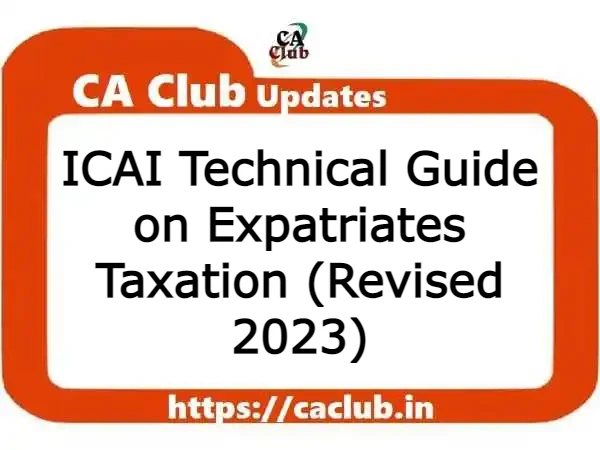The ICAI has published the revised 2023 edition of the “Technical Guide on Expatriates Taxation” to provide Members with the most recent updates on important international tax issues.
All the amendments made upto Finance Act, 2022 relating to international taxation, have been incorporated by the ICAI in the Technical Guide on Expatriates Taxation.
ICAI Technical Guide on Expatriates Taxation (Revised 2023 Edition)
Every year, people move countries for better education, training, and jobs. Income and net earnings’ taxation in their home country worries people who make most of their money from salary, consulting, and other professional services. Because an individual is taxed on his global income in the country where he lives, such income is mostly taxable.
To avoid double taxation, treaty benefits can be used in the resident country. Because an expatriate’s salary is usually taxed in the country where employment is exercised, the taxation of an individual’s professional services may create a permanent establishment subject to taxation in the country of source.
Today, services can cross borders faster, easier, and sometimes without physical presence, complicating the issue.
Given the importance of the subject, the ICAI has published the “Technical Guide on Expatriates Taxation,” which primarily covers updates relating to provisions of determining individuals’ residential status, taxability of capital gain from sale of listed equity shares, new tax regime for individual tax payers, taxation of provident funds, and taxation of retiree/pension income. The Guide now includes expatriate taxation rulings.
Technology, cross-border trade, and mergers and acquisitions have increased dramatically worldwide. Globalization’s rapid pace has benefited many nations’ economies. Human capital knowledge, experience, and skills have been seamlessly shared, putting expatriate employees in a critical position.
We’ve all seen global integration improve in recent years. Technology, cross-border trade, mergers, and acquisitions have improved economies in many countries. This has made global human capital knowledge and skills sharing easy. Thus, expatriates help global economic restructuring.
Many Indians work abroad, and vice versa. Expatriate employees are taxed in both their home country and their income country. Expatriate workers must understand international taxation of their income.
Globalization and opening up have changed the Indian economy. Non-resident taxation is crucial due to the inflow of funds from foreign institutional investors and non-residents.
Liberalization and globalisation require manpower movement, which has increased significantly. These activities have encouraged temporary and permanent mobility.
Expatriate income taxation requires more understanding. Expatriate employees’ income tax issues include remuneration, social security, and pension.
